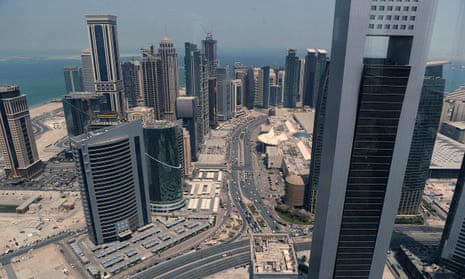An MP has written to University College London (UCL) urging it to “stamp out unacceptable employment practices” at its campus in Qatar, where there is evidence of forced labour and poor treatment of migrant workers.
Alison McGovern, shadow minister for international development, is the latest voice to put pressure on the university to improve the conditions of migrant workers on its Qatar campus.
This follows evidence collected by the International Trade Union Confederation (ITUC), which represents workers’ rights around the world, that migrant workers were being paid lower-than-expected wages, having their passports confiscated, trafficked for forced labour and living in cramped conditions.
In a letter to the university, seen by The Guardian, she writes: “These are practices which I’m sure you will agree are unacceptable in any workplace and which an institution such as UCL should be doing all it can to stamp out in any location that it is functioning, even if the individuals concerned are not direct employees of the college.”
She adds: “All British firms and organisations operating in Qatar need to look carefully at the way the workers they rely on are treated, and universities like UCL can be no exception to that.”
UCL Qatar – based in Education City, Doha, set to be the world’s leading education hub – is one of eight universities approached by ITUC and asked to “clamp down” on the poor treatment of administrative staff, maintenance workers, gardeners and cleaners working on their campuses.
The other universities from both the US and France, include: Georgetown University, Cornell University, HEC Paris, Carnegie Mellon University, Northwestern University, Virginia Commonwealth University and Texas A&M University.
Migrant workers are employed by subcontracting firms associated with the Qatar Foundation, a non-profit organisation that set up and funds Education City.
Jeffrey Vogt, the legal adviser for ITUC, stresses that just because workers aren’t employed by the universities, it does not mean that they should relinquish responsibilities.
“The United Nations guiding principles on business human rights all make clear that you have a responsibility, not just for people you directly hire but for potential labour rights violations that you contribute to or are even linked to,” says Vogt. “It’s clear that these universities do have a responsibility.”
Sally Hunt, general secretary of University College Union, says: “Our universities have a duty to ensure that people working on their foreign campuses have access to the same rights as they would be afforded in the UK. UCL should be using its influence to end this type of modern-day slavery and challenge practices that risk curtailing important academic freedoms. Hiding behind sub-contractors is indefensible.”
Only two of the eight universities, UCL and Georgetown, responded to a letter sent from the ITUC calling for them to investigate evidence of modern-day slavery on their campuses.
In its response UCL says it would be “inappropriate to conduct a review of the employment arrangements of another organisation”, even if the arrangements did not fit with its “world view”. It says it will raise the issues with the relevant authorities as the “opportunity to do so arises”.
UCL has since told The Guardian that it has agreed to meet Alison McGovern and will also speak to Qatar Foundation in the Autumn about improving standards for migrant workers.
The kafala (sponsorship) system makes it difficult to leave exploitative employers or leave the country, says Vogt, who has been able to talk to a handful of workers at Education City about their situation. According to Vogt, Georgetown is the only university so far to have started to address the issue through surveying its subcontractors and those of Qatar Foundation.
A spokesperson for Georgetown says that the university is “committed to the fair and just treatment of all employees” working on its campuses.
The Qatar revelations follow a string of other cases where universities have been questioned about their quality of labour standards and their decision to set up campuses in countries with bad human rights records.
Most recently, New York University was in hot water after an investigation by the New York Times exposed mistreatment of migrant workers at its Abu Dhabi campus.
A number of UK universities have also made headlines for their decisions to do business in Uzbekistan: the University of Westminster set up a campus in the country in 2002, and at least five others – Cambridge, Bath, the University of East Anglia, the London College of Fashion and London Metropolitan University – have established partnerships with colleges in the country, despite widespread and repeated allegations of mass shootings, torture and forced labour there.
The globalisation of higher education and a shift towards greater competition has seen many prestigious universities set up campuses overseas. But should universities put human rights ahead of money-making opportunities abroad?
Simon Marginson, professor of international higher education at the Institute of Education, says: “Perhaps it has been too easy to sign on the dotted line without full scrutiny of the rights (or lack of rights) of migrant workers and a long hard look at local gender politics.
“Universities do their due diligence but often tend to focus more on the business aspects than the cultural context, even in the case of long-term deals.”
He adds: “UK higher education should now be wiser. It is possible to build mutually beneficial educational links in emerging states while maintaining home country standards in labour regulation.”
Qatar has become a byword for modern slavery, says Frances O’Grady, general secretary for Trades Union Congress: “UCL can’t just wash its hands because the workers aren’t directly employed by them.”
Join the higher education network for more comment, analysis and job opportunities, direct to your inbox. Follow us on Twitter @gdnhighered.

Comments (…)
Sign in or create your Guardian account to join the discussion